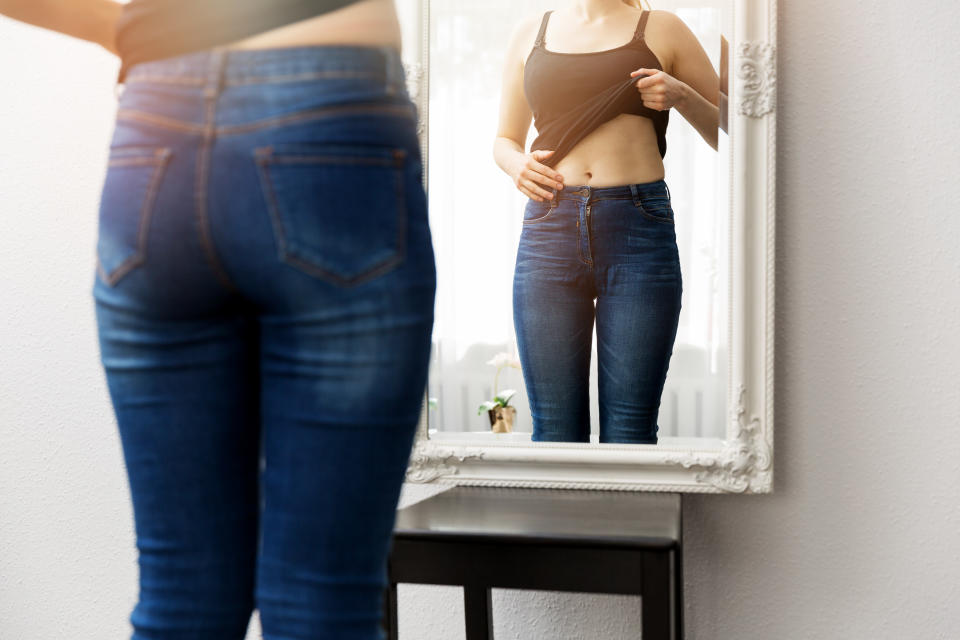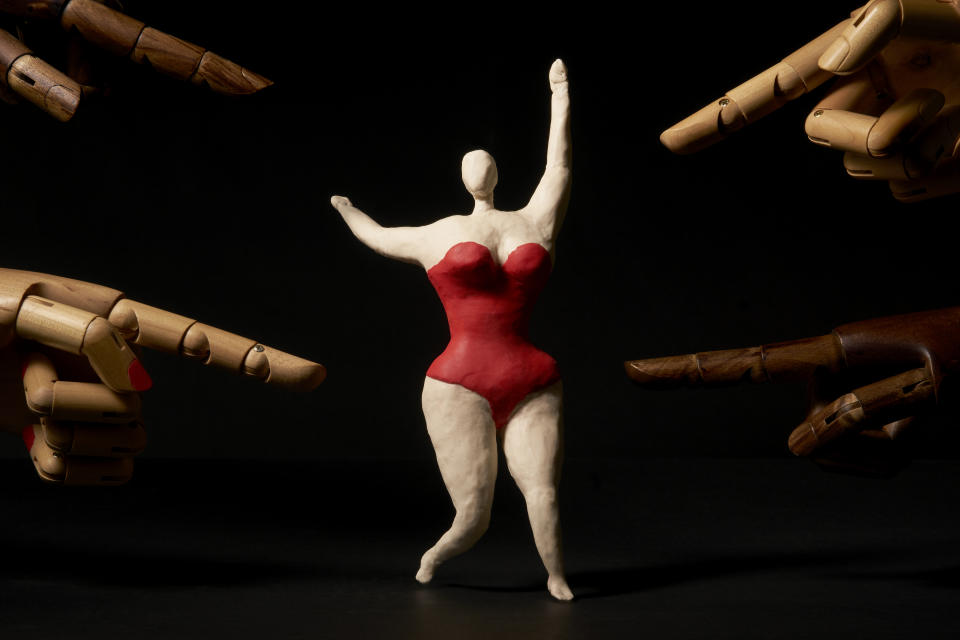What now? Making sense of body positivity in a fatphobic world

Introducing EveryBody, a series by Yahoo Canada highlighting the people and organizations working to end weight stigma, promote size inclusivity and prove that everybody and every body has value.
Earlier this year, I began building what I thought was going to be an examination and celebration of body positivity. As soon as I received the green light, I rolled up my sleeves and immersed myself in a world more complex than I had ever imagined.

My education into body positivity was layered. I began by scouring social media and familiarizing and analyzing influencers with hundreds of thousands, sometimes millions of followers. I bounced from one account to another, noticing the patterns the “influencers” adopted from their contemporaries to turn their account into a full-fledged career.
ALSO SEE: 'We should be proud of our size': How this beauty influencer became a fashion industry changemaker
At first, my reaction to these women and their content was not unlike that of my grandparents when I first showed them a video on my iPhone. I shook my head and said, “Well I’ll be damned,” and kept scrolling through photo after photo of women proudly bearing their stretch marks, cellulite and stomach rolls.
There were levels within the community, and as follower counts dwindled the spectrum opened up to reveal people who wanted you to love your body or feel neutral about your body, to celebrate fat bodies and bodies outside the palatable white, hourglass frame that had managed to put one foot into mainstream media, while LGBTQ+ bodies and people of colour carved out their own space online.
However, it soon became abundantly clear, as I was ushered into the realm of fat activism that I began to pay attention not to the influencers, but to the followers. Through reading many comments I saw how for a majority of people, social media was the only place they felt accepted and safe to share stories of being shamed by doctors, by bosses, family members, peers and romantic partners.
ALSO SEE: 'It was time to stop hiding': How shaving her head helped this blogger embrace her 'inner warrior'
When talking about weight stigma and fatphobia, social media is a soft pitch for change. While social media has undoubtedly been a necessary first step towards inclusivity, body diversity and dismantling of diet culture, there is only so much that can be achieved from looking at a screen. Every photo and call for body empowerment was existing on a spectrum that hinged on the idea of respecting our bodies, whatever its size or shape may be. Still, how can we move towards respect and size inclusivity when offline, society reinforces weight bias?
At present, weight is not one of the criteria protected under the Human Rights Code of Canada, meaning it is perfectly legal for an employer to discriminate or terminate an employee because of their size, for a larger person to make less money because of their size as well as be denied healthcare and housing access. Both Manitoba and Ontario have attempted to have weight protected on a provincial level, but have failed to achieve change even under the criteria of considering obesity as a disability.
Currently in the United States, Michigan is the only state where weight discrimination is illegal; cities such as San Francisco, Calif., Madison, Wis., and Washington D.C have also included weight into their municipal code on discrimination.
ALSO SEE: 'Body positivity isn't enough': Why more people are saying goodbye to the 'love yourself' movement
The idea still persists that weight is something that individuals have total control over. It becomes a moral failure for someone to be considered “obese” while those who appear thin or even slightly larger, see themselves as “healthy.”
“I have a lot of empathy for individuals who are caught in fatphobia. It makes sense, given that we’re in a culture which is really focused on shaming people about their bodies,” Dr. Linda Bacon, PhD and associate nutritionist at University of California, Davis said during an interview with Yahoo Canada. “We have huge industries that benefit from us believing that we’re too fat and that there’s something that’s wrong with us,” the author of Health at Every Size: The Surprising Truth About Your Weight and Body Respect: What Conventional Health Books Get Wrong, Leave Out, or Just Plain Fail to Understand about Weight, continued. “It makes sense that individuals absorb those messages. It’s really important that we disentangle those messages.”

Erin Harrop, a doctoral student at the University of Washington and social worker at Seattle Children’s Hospital agreed. As a former board member of the Association for Size Diversity and Health (ASDAH), Harrop worked as part of the advocacy group to help promote the Health At Every Size Model®, an alternative to public health policies to help eliminate weight stigma and provide a higher level of care and respect to people of all sizes. The HAES approach to weight emphasizes a person’s overall health rather than their weight as the goal of eating and exercise while recognizing the spectrum of factors that contribute to health. As Harrop explained, weight is one of the last socially acceptable forms of discrimination, tied to a larger social hierarchy that values ableism.
ALSO SEE: 'I was completely devastated': Mother who never smoked diagnosed with stage 4 lung cancer
“There’s an expectation that we have to be the healthiest, least expensive citizens in the world. Weight stigma is so entrenched because it’s not just about weight, but it’s about healthcare stigma, capitalism and classism,” Harrop said. “If you look at classism, poor people are more likely to be fat, and the poor are still seen as a burden on society. In a culture today where many people are starting to question other isms, racism, classism and homophobia, sizeism is really considered an acceptable ism because it’s perceived as completely under people’s control. If rich people were more likely to be fat than poor people of colour, then I don’t think we would see the same manifestation of this. It’s all tied together.”
The gap between online progress towards inclusivity and offline prejudice against larger bodies was puzzling. The more I tried to wrap my head around the evidence that challenged my own views about weight, the more I struggled to understand why the HAES model and sizeism weren’t being amended into medical school curriculum or public policy. If we have come so far to seek diversity and inclusion in media, why can’t we extend that passion for change to healthcare and policy? For Harrop, it all goes back to meaning making.

When people see fat people accepting and celebrating their bodies, their first instinct is to shame them for seemingly promoting an unhealthy lifestyle. To see someone reclaiming their power and demanding change threatens to disrupt the social understanding of what it means to be considered privileged and successful.
ALSO SEE: 'You don't have to be a certain size': How Iskra Lawrence became the face of a new era in fashion
“There’s an idea surrounding people who have lost weight and have kept it off for some amount of time that they’ve done something amazing. They believe they’ve conquered something others can’t do or are too lazy to do. All of these things help people establish themselves as superior to others,”she said. “If we say that say perhaps size is due to genetics or chance, you lose the esteem that comes with that. It’s scary for people to think of things that are not in their control. Many people gain weight as they age. Bodies can change for reasons we anticipate and bodies can change for reasons we don’t anticipate and that’s scary for people.”
Likewise, weight bias helps many people feel protected, or immune from disease and illness. It’s easy for people to point the finger at larger bodies and say a person will die from their size, rather than to recognize the fragility of health and mortality.

“People are healthy or unhealthy for a whole variety of reasons. We can still treat them with respect. All the diseases that we blame on obesity, thin people get them, too,” Bacon shared. “A lot of people are just looking for an easy solution; they want the basic rules. Unfortunately, that doesn’t work. Our bodies have a weight regulation system that’s built into them and if we try to control them by using someone else’s rules about what to eat or how much to eat, we find that it undermines systems in our bodies that might need a different number of calories. It’s never effective in the long run and yet there’s the fantasy that it will be.”
ALSO SEE: Ashley Graham shows off growing bump and stretch marks: ‘Trying to embrace my new body’
As someone who lives with an eating disorder and struggles to detach value from weight, I am grateful for social media to help desensitize me to the idea that larger bodies are inherently bad or ugly. My own internalized fatphobia prevents me from extending acceptance and body liberation to myself, but something I am consciously working towards. Still, my gratitude pales in comparison to my frustration that the inequality in social systems helps contain body positivity as a vanity issue caused by the media.
How do we connect the puzzle pieces to make actual change? Aside from education and policy change, it begins with the individual and a massive shift in perspective.
“Show compassion for whatever choices people are making in their present,” Bacon said. “If we start from a place of judgement it’s hard to change, but if we start from a place of compassion for why we make the choices we make no matter how damaging they are - we can see what we’re looking for. What we’re really looking for is more respect in the world. We have to have compassion for how hard it is to live in a stigmatized body.”
Let us know what you think by commenting below and tweeting @YahooStyleCA! Follow us on Twitter and Instagram.



